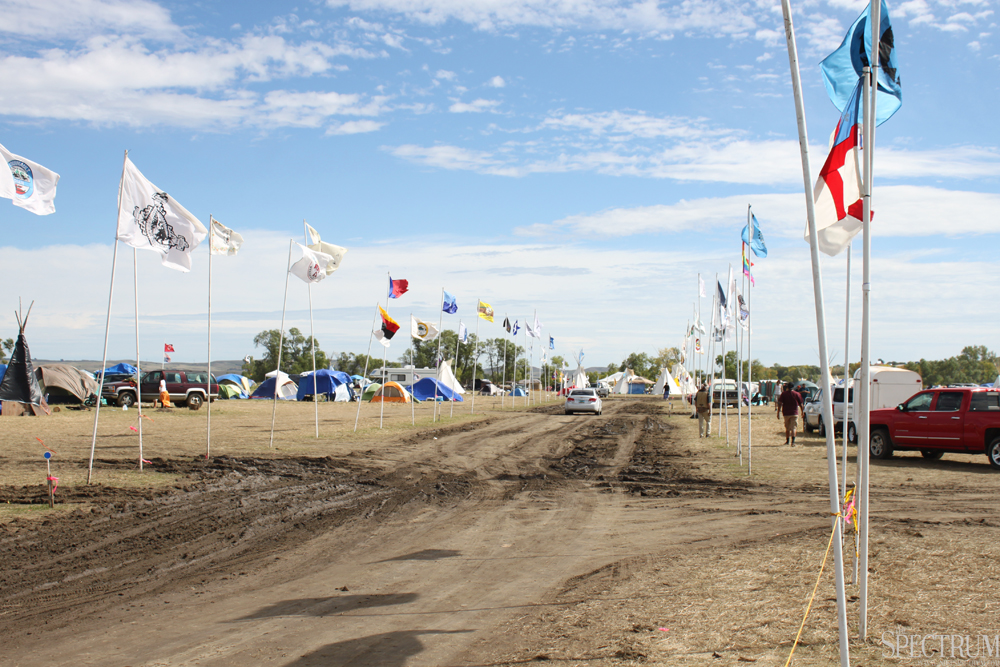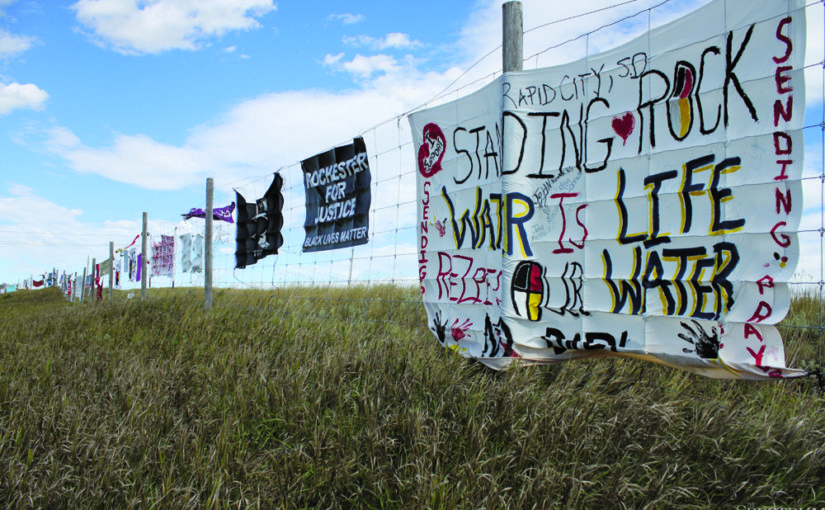Amidst the rolling hills and yellow leaves of south-central North Dakota, there is a scar in the beautiful landscape. Broken land bulldozed into piles disrupts views of grassland and bluffs reminiscent of areas more common in the western part of the state. The bulldozed area stops just short of a sprawling camp of people occupying the area in opposition to the construction of the Dakota Access Pipeline.

A small outpost known as the Sacred Ground Camp forms the frontline a mere stone’s throw away from land that was recently bulldozed. The camp was established after security forces for the pipeline brought in dogs which bit some demonstrators on Saturday, Sept. 3.
“It was a peaceful demonstration,” Michael Kudlick, head of the kitchen for the Sacred Ground Camp said, “but they brought in dogs, and people got bitten. Children were there too, and a dog bit a woman on her breast.”
A small group of people established the frontline camp to prevent the pipeline from crossing Highway 1806 to get to the river, and some members of the Sacred Ground Camp and the main camp are planning on digging in to prepare for winter. Signs of construction and preparation abound in the camps, with people building fences and stacks of supplies everywhere, and even rumors about constructing some traditional longhouses.
Just down the hill from the advance camp, the main camp sprawls out on both sides of the river.
Depending on the day, the population of the main camp varies between 600 to upwards of 5,000 individuals, with weekends generally bringing higher populations. However, individuals at the camp are not just from the immediate area — some are from both coasts, Hawaii and even Sweden, Australia and other countries all over the globe.
“Indigenous peoples from all over the planet are coming together in solidarity,” said Mark K. Tilsen, Jr. “This isn’t a global awakening as far as awareness about environmental issues, but it is a part of a change.”
“I drink this water,” Tilsen commented, “and so do 17 million other people and nearly a quarter of South Dakota.”
Tilsen sees any attempt to create a pipeline that minimizes risk as fruitless.
“They all break — every device built eventually fails. The standard lifespan for a pipeline is 25 years, but very few are retired before leaking. And not only is it a bad idea, it’s just bad capitalism. Risking 150 years or more of clean drinking water for a few years of oil production is ridiculous,” Tilsen said. “The idea that it won’t leak is a literal pipe dream.”
The individuals we spoke to wished to accent the fact that the occupation is not targeted at specific people.
“We aren’t here to fight police or pipeline workers; we are here to stand against the pipeline,” Tilsen said, “and I am here to stand against the misconception that we need a petroleum-based economy.”
Many throughout the camp echoed this sentiment. Williamette Hardy-Morrison, of the Red Lake Nation from Ponemah, Minnesota, made the distinction between protesting and taking a stand.
“We are not protestors, we are protectors of what is sacred to life — all medicines and water,” Hardy-Morrison said.
Jennifer Robin, or “Miss Jiff,” who hosts the radio show Dreamwalk (which is broadcast worldwide at KVMR.org) highlighted the fact that the occupation is not a White vs. Indian issue. In fact, close to 30 percent of the camp’s population is white.
“This isn’t a matter of ‘White versus Indian,’ it’s a matter of modern American life against the corporation. We just want a voice in how America’s future goes,” Miss Jiff said.
“The infrastructure and product isn’t going to benefit the people,” she said, “it’s going to the pockets of the corporation. None of us will see the benefit from anything that leaks into a river that supplies water for millions of people.
“It’s just cream in the corporate cookie, and it sheds a whole lot of light on the difference between human value and the impact of the corporate dollar. We all know that we should be getting away from fossil fuels. It should be common sense that you don’t shit where you eat. We need to ask ourselves if there is a better way,” Miss Jiff commented.
Many members of the occupation are standing in support of Standing Rock because of similar experiences or concerns in their own communities.
“The vast majority of indigenous communities are at threat from mineral and resource extraction,” Tilsen commented.
When asked about his reasons for coming to the camp, Harry Beauchamp, Jr., told of his own experience in Northeastern Montana. He used to go camping and fishing in the area before drilling in the ’80s contaminated wells and water in the area.
“The more natives here, the better the stand,” Beauchamp said.
Beauchamp, his daughter Cherish and future son-in-law Mike Sullivan brought 30 sleeping bags, cases of water and nine cords of wood to help support the cause.
“Our homeland is in jeopardy, but we want to say that we are still here,” Sullivan said. “If we let this happen, we will give the government and large corporations a stepping stone to just walk over us.”
A common spirit runs throughout the camp. Individuals don’t see themselves as protesters; they see themselves as protectors. Some are in the kitchens to help feed the camp. Others are at work setting up shelters or tents. Still others are at work chopping donated wood to supply the camp with firewood. A few lawyers are gathered in a tent to assist with legal issues.
Security doesn’t allow alcohol, drugs or weapons in the camp, and they circulate throughout the area to keep everyone safe.
Volunteers and generosity abound, with many new arrivals bringing supplies to help support those already established in the camp. Helpful hands are everywhere, and there is a pervasive welcoming spirit.
In the rolling hills and yellow leaves of North Dakota, a camp spreads near a river. Within the camp lives a multitude of people from a multitude of backgrounds. And within the people lives a spirit of resistance, of pride, of loyalty and of compassion.
